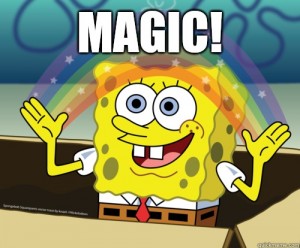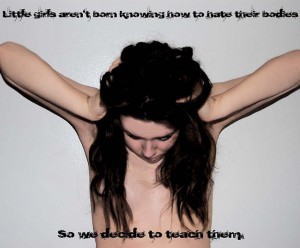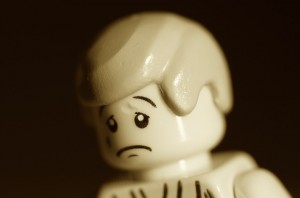Trigger Warning for Body Image Issues and Eating Disorders
Ah, fat — that charged, overloaded, connotation-carrying word. There is a lot I could say about the word, but for the sake of my point, let us fast-forward past the debates over fat-shaming, Health at Every Size, thin privilege, BMI, and so on. Let us make even more haste as we zoom right past people who simply hate fat people for whatever (or no real) reason.
Oh, and for the love of all that is creamy and delicious, let me acknowledge that I am aware that thin women face incredible amounts of body-shame, body image issues, and lookism as well. My discussing issues related specifically to being a fat woman does not invalidate thin women’s problems and pain. As a lifelong fattie, I simply cannot speak for them.
I want to focus on the well-meaning friends, relatives, and lovers of fat people who, in their haste to reassure the people they care about, can’t see the difference between discussions regarding external reality versus talk about self-image.
Over and over again, well-meaning people take away fat women’s ability to discuss the issues that affect them. Often, when a fat woman dares to mention anti-fat bigotry in society, she is told that she should “accept herself” or some variation of that sentiment thereof. Alternately, she might be told that the person in question finds her attractive. What happens is that the assumption that all fat women need to be cheered up and reassured takes precedence over anything the fat woman in question is actually saying.
Some of the most confident, self-assured ladies I’ve ever had the pleasure of encountering are lectured about self-esteem and self-acceptance instead of having their thoughts acknowledged when they speak of anti-fat bias. How incredibly condescending it is to insist that someone is talking about personal sadness when they are describing the reality of their lived experiences. How disappointing it is to the lady in question to find that others’ perceptions of her self-image automatically override the words coming out of her mouth.*
Although I’ve lost a decent amount of weight in the past 18 months, I still firmly qualify as fat, especially here in sunny, superficial Southern California. After years of self-loathing followed by years of working on my self-image issues, I’ve come to a few conclusions, conclusions about which I speak only using the most carefully-curated of words. No matter how much I try to denote exactly what I’m saying, I still get well-meaning but wholly misguided people attempting to soothe me where I needed no comfort in the first place. Worse, their focus on what they perceive to be the issue, i.e. my self-image, robs me of the power to talk about a real issue that affects me, i.e. fat-hate.
I do not think that I am ugly. Au contraire. Why would I spend so much time and effort on buying fun clothing, experimenting with make-up and hair products, and hunting down cute shoes that fit my size 10-11 wide feet — because I think I’m not worth looking at?
Ha.
There was certainly a time when I thought I wasn’t worth much at all. I shrouded myself in dowdy clothing and applied overly-thick black lines around my eyes, hoping to bring attention to what I thought was my only good feature. That time is well behind me, thank you very much, and I’d like to be treated as the woman I am, not the self-loathing girl I once was.
Though the personal is often political, the political is not always personal.
So if I don’t think I’m ugly, why bring up fat hate? call myself fat or a fattie? mention anti-fat bigotry that has been hurled in my direction?
As good as I feel about myself most of the time, that I don’t live in denial of fat-hate doesn’t mean that I think of myself as unattractive, it means I acknowledge my reality and my lived experiences. I direct attention to society’s hatred of fat people for the exact same reasons that I clamor for attention for unfair discrimination of any kind: in the hopes that people will recognize what they’re doing and, you know, work to change it.
I’m talking not about any perceived ugliness in myself, I’m talking about how ugly society can be.
So, how exactly can you stop patronizing your fat relative, friend, or lover when she speaks of that kind of ugliness? If she mentions society’s shitty treatment of her, you can stop denying her experiences and instead say, “Wow, that is really shitty!” Even better, when you see shitty behavior, you can call it out or at least not participate in it.
* If she is actually hating on herself, that’s a different matter, one to be addressed in a future post.










